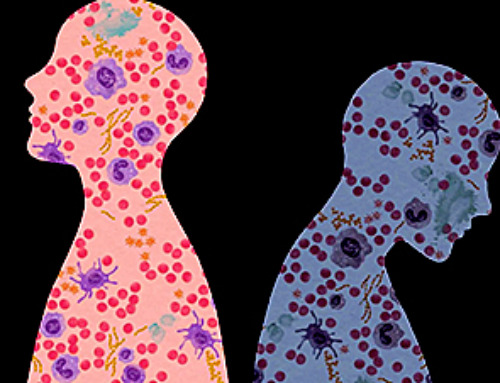Teenage girls’ brains may have prematurely aged by up to four years during the Covid pandemic, an American study suggests.
Adolescent boys weren’t immune either with their brain’s also showing signs of undue wear and tear, albeit by only one-and-a-half years.
Experts suggested the difference was due to lockdown‘s social restrictions having a disproportionate impact on teenage girls.
Researchers from the University of Washington looked at 160 MRI scans taken from a cohort of 9-to-17-year-olds collected in 2018, and then compared these to scans to 130 taken post-pandemic, 2021-2022.
They found a process called cortical thinning — where the organ effectively rewires itself between childhood and adolescence — was far more advanced than it should be amongst pandemic teens.
Teenage girls’ brains (left) may have prematurely aged by up to four years during the Covid pandemic, an American study suggests. Adolescent boys weren’t immune either with their brain’s also showing signs of undue wear and tear, albeit by only one-and-a-half years (right)
Whilst cortical thinning does occur naturally some studies have linked accelerated thinning to being exposed to anxiety or stress and greater risk of developing these disorders in life.
It’s not yet clear if the observed advanced thinning is permanent or if it will have any negative impact on teenagers’ long-term health or educational aspirations.
The study, published in the journal Proceedings of the National Academy of Sciences, also found differences in which parts of the brain were ageing in boys and girls.
For example, while both sexes had advanced ageing in the part of the organ related to processing visual information, girls also saw premature thinning of areas linked to emotions, interpreting faces and understanding language.
These are all areas critical to facilitating effective communication.
Study author Professor Patricia Kuhl, an expert in learning and brain sciences at Washington, said researchers had been shocked at the extent of the difference between boys and girls.
She told the New York Times ‘a girl who came in at 11, and then returned to the lab at age 14, now has a brain that looks like an 18-year-old’s;.
Professor Khul also told the Guardian that she believes part of the difference reflects teenage girls’ greater reliance on social groups than their male counterparts.
‘Girls chat endlessly and share their emotions. They are much more dependent on the social scene for their wellbeing and for their healthy neural, physical and emotional development.’
She added the findings were ‘reminder of the fragility of teens’ and suggested parents find the time to talk to their children about their experiences of the Covid pandemic.
‘It’s important they invite their teens for a coffee, for a tea, for a walk, to open the door to conversation. Whatever it takes to get them to open up.’
The study is the latest to suggest the Covid pandemic, and by extent the lockdown restrictions that separated family and friends for months, took a toll on young’s people’s mental health.
However, some experts have cautioned against the over-interpretation of the study’s findings.
Dr Bradley S. Peterson, a peadiatric psychiatrist and brain researcher at Children’s Hospital Los Angeles, who was not involved in the study was among these.
He noted a number of limitations, one of which is that though the authors were keen to link the changes to the social isolation of lockdowns other possibilities exist such as increased screen-time and use of social media and less exercise.
Dr Peterson also said that the observed thinning may not be a bad thing and it could ‘represent nature’s adaptive response in the brain that conferred greater emotional, cognitive and social resilience’.
News
This Simple Brain Exercise May Protect Against Dementia for 20 Years
A long-running study following thousands of older adults suggests that a relatively brief period of targeted brain training may have effects that last decades. Starting in the late 1990s, close to 3,000 older adults [...]
Scientists Crack a 50-Year Tissue Mystery With Major Cancer Implications
Researchers have resolved a 50-year-old scientific mystery by identifying the molecular mechanism that allows tissues to regenerate after severe damage. The discovery could help guide future treatments aimed at reducing the risk of cancer [...]
This New Blood Test Can Detect Cancer Before Tumors Appear
A new CRISPR-powered light sensor can detect the faintest whispers of cancer in a single drop of blood. Scientists have created an advanced light-based sensor capable of identifying extremely small amounts of cancer biomarkers [...]
Blindness Breakthrough? This Snail Regrows Eyes in 30 Days
A snail that regrows its eyes may hold the genetic clues to restoring human sight. Human eyes are intricate organs that cannot regrow once damaged. Surprisingly, they share key structural features with the eyes [...]
This Is Why the Same Virus Hits People So Differently
Scientists have mapped how genetics and life experiences leave lasting epigenetic marks on immune cells. The discovery helps explain why people respond so differently to the same infections and could lead to more personalized [...]
Rejuvenating neurons restores learning and memory in mice
EPFL scientists report that briefly switching on three “reprogramming” genes in a small set of memory-trace neurons restored memory in aged mice and in mouse models of Alzheimer’s disease to level of healthy young [...]
New book from Nanoappsmedical Inc. – Global Health Care Equivalency
A new book by Frank Boehm, NanoappsMedical Inc. Founder. This groundbreaking volume explores the vision of a Global Health Care Equivalency (GHCE) system powered by artificial intelligence and quantum computing technologies, operating on secure [...]
New Molecule Blocks Deadliest Brain Cancer at Its Genetic Root
Researchers have identified a molecule that disrupts a critical gene in glioblastoma. Scientists at the UVA Comprehensive Cancer Center say they have found a small molecule that can shut down a gene tied to glioblastoma, a [...]
Scientists Finally Solve a 30-Year-Old Cancer Mystery Hidden in Rye Pollen
Nearly 30 years after rye pollen molecules were shown to slow tumor growth in animals, scientists have finally determined their exact three-dimensional structures. Nearly 30 years ago, researchers noticed something surprising in rye pollen: [...]
NanoMedical Brain/Cloud Interface – Explorations and Implications. A new book from Frank Boehm
New book from Frank Boehm, NanoappsMedical Inc Founder: This book explores the future hypothetical possibility that the cerebral cortex of the human brain might be seamlessly, safely, and securely connected with the Cloud via [...]
How lipid nanoparticles carrying vaccines release their cargo
A study from FAU has shown that lipid nanoparticles restructure their membrane significantly after being absorbed into a cell and ending up in an acidic environment. Vaccines and other medicines are often packed in [...]
New book from NanoappsMedical Inc – Molecular Manufacturing: The Future of Nanomedicine
This book explores the revolutionary potential of atomically precise manufacturing technologies to transform global healthcare, as well as practically every other sector across society. This forward-thinking volume examines how envisaged Factory@Home systems might enable the cost-effective [...]
A Virus Designed in the Lab Could Help Defeat Antibiotic Resistance
Scientists can now design bacteria-killing viruses from DNA, opening a faster path to fighting superbugs. Bacteriophages have been used as treatments for bacterial infections for more than a century. Interest in these viruses is rising [...]
Sleep Deprivation Triggers a Strange Brain Cleanup
When you don’t sleep enough, your brain may clean itself at the exact moment you need it to think. Most people recognize the sensation. After a night of inadequate sleep, staying focused becomes harder [...]
Lab-grown corticospinal neurons offer new models for ALS and spinal injuries
Researchers have developed a way to grow a highly specialized subset of brain nerve cells that are involved in motor neuron disease and damaged in spinal injuries. Their study, published today in eLife as the final [...]
Urgent warning over deadly ‘brain swelling’ virus amid fears it could spread globally
Airports across Asia have been put on high alert after India confirmed two cases of the deadly Nipah virus in the state of West Bengal over the past month. Thailand, Nepal and Vietnam are among the [...]






















